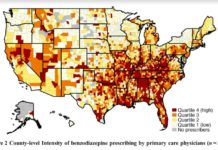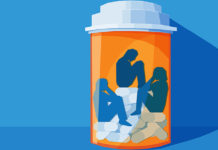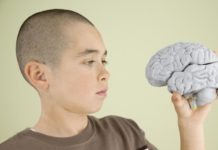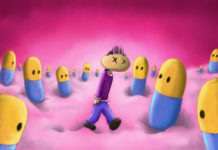Non-Pharmacological Interventions More Effective For Health in Schizophrenia
Review compares the effectiveness of pharmacological and non-pharmacological interventions for improving physical health outcomes in people diagnosed with schizophrenia.
5 Steps to Personalize Deprescribing Practices
Researchers identify simple ways for clinicians to begin deprescribing conversations.
Polypharmacy Associated with Cognitive Decline in Elderly Patients
Study finds that elderly patients taking at least 5 medications were at increased risk of mild cognitive impairment and dementia.
Study Identifies Psychiatric Patients at Greatest Risk of Coercion
In an effort to reduce coercion, researchers isolate associated factors including age, relationship status, location, and diagnosis.
Prenatal Valproate Exposure Linked with ADHD Diagnosis in Children
Children who were exposed to anti-seizure drug valproate in utero were 48% more likely to develop ADHD, according to a new study.
The Good, the Bad, and the Ugly: An Infographic on Bipolar Drugs
Bipolar drug therapy is a balancing act of benefits vs. harms. Odds of attributable benefit cluster in a 15-25% band, so 75%-85% don’t see substantial benefit. Stated differently, if five people take a bipolar drug, only one is likely to see substantial improvement due to it, but all five will have side effects.
Individuals with Psychosis Symptoms More Likely to be Victimized
Individuals diagnosed with a psychotic disorder are 4-6 times more likely than the general population to experience victimization.
The Monster in Our House: What Psychiatric Medication Did to My Father
When we eliminated his last psychotropic prescription, it was as if my father came back from the dead. All of the monster-like qualities that we thought were severe symptoms of his dementia have practically disappeared. We’ve found ourselves questioning whether he has dementia at all.
Antipsychotics Associated with High Risk of Death in Children
A new study has found that children and adolescents taking a high dose of antipsychotics are almost twice as likely to die of any cause than children on other types of medications.
Claims That Long-term Antipsychotic Use Leads to Better Outcomes are Misleading, Researchers Argue
Researchers reveal the limitations and misleading interpretations of two recent studies that claim to demonstrate that long-term antipsychotic use leads to better outcomes.
Researchers Ask, ‘Why Do Antidepressants Stop Working?’
An international group of researchers, including several with financial ties to manufacturers of antidepressants, explore possible explanations for why long-term users of antidepressants become chronically depressed.
Increased Suicidality in Cymbalta Trial for Fibromyalgia in Teens
A new as-yet-unpublished trial of duloxetine (Cymbalta) for fibromyalgia has presented more evidence of suicidal events in teens.
Benzodiazepine Prescriptions in Older Adults Used in Rural and Low Income Areas
Benzodiazepine prescription practices may be in response to an epidemic of distress, rather than being used to treat specific mental health diagnoses.
Prazosin Ineffective for Preventing Suicidal Thoughts — May Worsen Nightmares
A new study found that prazosin was associated with increased insomnia and nightmares, and did not reduce suicidal thoughts.
Anatomy of an Opioid Epidemic
Long-term opioid prescribing has not only been shown to not be helpful for chronic pain; it in fact worsens pain by repeatedly causing tolerance and withdrawals (the main symptom of which is pain). This is analogous to how psychiatric drug use, though often helpful initially, ultimately can cause people to become chronically “mentally ill.”
My Fight Against Antidepressants, Part III: Breaking Free
I had managed to get off the drugs again, this time with practically no withdrawal reactions other than some disturbances to my sleep which eventually settled down. I truly feel that I have been given a second chance because I am aware of how many people struggle terribly with these drugs just as I did.
Researchers Warn of “Brain Atrophy” in Children Prescribed Antipsychotics
Researchers discuss the evidence that antipsychotic medications may cause brain atrophy in children, whose brains are still developing.
Study Explores Connections Between Diet and ‘Serious Mental Illnesses’
Study finds that individuals diagnosed with schizophrenia, bipolar disorder, and depression have diets that are more inflammatory and higher in calories.
The Psychological Effects of the Zero-Tolerance Immigration Policy
Journal releases a compilation of articles detailing how zero-tolerance policy may impact mental health.
About 1 in 100 Children Treated with Ritalin Experience a Serious Adverse Event
A recent Cochrane review has found that serious adverse events occur for about 1% of children and adolescents treated with Ritalin.
Gradual Tapering is Most Successful for Withdrawal from Antipsychotics
Mixed-Methods study explores the experiences of antipsychotic discontinuation among service users.
The Conflicts That Result From Globalizing Euro-American Psychology in India
Researchers examine the transformation of work, life, and identity in India as a result of Western corporate and psychological culture.
Systematic Review Finds Antidepressant Withdrawal Common and Potentially Long-lasting
Prominent researchers conduct a review of antidepressant withdrawal incidence, duration, and severity. Results lead to call for new clinical guidelines.
Researcher Challenges Clinical Effectiveness of Antidepressants
A new article in BMJ Evidence-Based Medicine addresses common misinterpretations of the efficacy research on antidepressants.
Hallucinations Reported as Side Effect of ADHD Medication
Hallucinations and other psychotic symptoms have been reported after methylphenidate (Ritalin) treatment for ADHD.

































